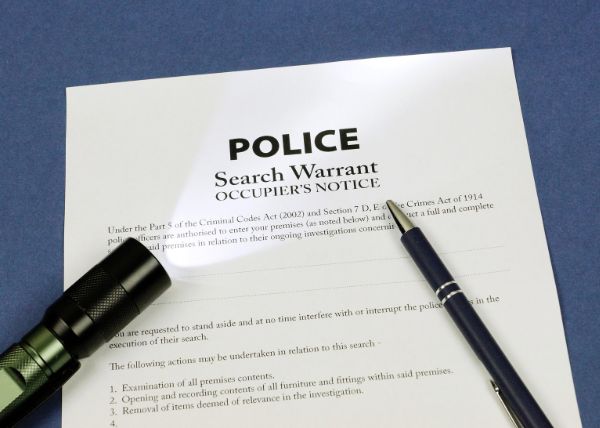
Call Now For A Free Consultation:

Call Now For A Free Consultation:

The Fourth Amendment to the United States Constitution is a fundamental component of our legal system, designed to safeguard individuals from unreasonable searches and seizures by the government. Understanding the essence of this vital constitutional right is essential in navigating encounters with law enforcement. If you believe your civil rights have been violated, contact Justin Palmer Law Group for a free consultation to discuss your case.
The Fourth Amendment to the United States Constitution is a cornerstone of American civil liberties, protecting individuals from unreasonable searches and seizures by the government. It reads:
"The right of the people to be secure in their persons, houses, papers, and effects, against unreasonable searches and seizures, shall not be violated, and no Warrants shall issue, but upon probable cause, supported by Oath or affirmation, and particularly describing the place to be searched, and the persons or things to be seized."
This amendment is fundamentally about the right to privacy and limiting governmental power. It ensures that law enforcement agencies cannot invade your privacy or property. For a search or seizure to be considered reasonable, it typically requires a warrant issued by a judge. This warrant must be based on probable cause—meaning there must be a reasonable belief, supported by facts, that a crime has been or is being committed.
However, there are exceptions to the warrant requirement. For example, if evidence is in plain view, if there is a risk of the evidence being destroyed, or if the search is incident to a lawful arrest, law enforcement may not need a warrant. Understanding these nuances is crucial, especially in protecting your rights if you believe a violation has occurred.
In the context of civil rights, the Fourth Amendment is often invoked in cases of police misconduct, where claims of unlawful searches, excessive force, or wrongful arrests are made. At Justin Palmer Law Group, we are dedicated to defending your Fourth Amendment rights, ensuring that any infringement upon your constitutional protections is addressed with the seriousness it deserves.
Under the Fourth Amendment, law enforcement officers generally need a warrant to search your property. This warrant must be issued by a judge and based on probable cause, which requires a reasonable belief that evidence of a crime will be found in the place to be searched. The warrant must also be specific, detailing the exact location to be searched and the items or individuals to be seized.
However, there are several situations where law enforcement may legally search your property without a warrant:
If you voluntarily allow the police to search your property, they can do so without a warrant. It’s important to know that you have the right to refuse consent, and such a refusal cannot be used against you.
If you are lawfully arrested, the police can search the area within your immediate control to ensure officer safety or prevent the destruction of evidence. This might include a search of your person, your vehicle, or the area surrounding you at the time of arrest.
If an officer is lawfully present in a location and sees evidence of a crime in plain view, they can seize that evidence without a warrant. For example, if an officer is in your home legally and sees illegal drugs on a table, they can confiscate them and use them as evidence.
In emergencies, law enforcement can conduct a search without a warrant if waiting for one could lead to harm, the destruction of evidence, or the suspect escaping. This might include situations where they hear someone in danger or suspect that critical evidence is about to be destroyed.
Due to the mobile nature of vehicles, if police have probable cause to believe a vehicle contains evidence of a crime, they can search it without a warrant. However, this exception is not limitless, and specific legal standards must be met.
Understanding these exceptions is vital for knowing your rights and when they may be legally bypassed by law enforcement. At Justin Palmer Law Group, we are committed to ensuring that any search of your property adheres strictly to constitutional standards. If your rights have been violated during a search, we will fight to protect your freedoms and hold law enforcement accountable.

If you believe that your property was illegally searched by law enforcement, it’s crucial to take immediate steps to protect your rights. An illegal search can lead to serious violations of your privacy and civil liberties, and any evidence obtained through such a search may be inadmissible in court. Here’s what you should do if you suspect your property was unlawfully searched:
An illegal search can have significant consequences, but you don’t have to face it alone. Justin Palmer Law Group is dedicated to protecting your constitutional rights and holding law enforcement accountable for unlawful actions. If your property was searched without proper legal justification, we will work tirelessly to ensure that your rights are upheld and that justice is served.
At Justin Palmer Law Group, we understand the profound impact that police misconduct can have on your life. When law enforcement officers overstep their boundaries, violate your rights, or engage in unlawful behavior, it can leave you feeling powerless and uncertain about where to turn. That’s where we come in.
As experienced police misconduct lawyers, we are dedicated to protecting your constitutional rights. We thoroughly investigate every detail of your case to determine whether your rights were violated. Whether it’s an illegal search, excessive force, wrongful arrest, or another form of misconduct, we work tirelessly to ensure that those responsible are held accountable.
One of the most critical roles we play is challenging the legality of the actions taken against you. We will scrutinize the evidence, question the procedures followed by law enforcement, and identify any breaches of protocol or violations of your rights. If your property was searched without a warrant or probable cause, we will fight to have any unlawfully obtained evidence excluded from court.
If your rights were violated, you may be entitled to file a civil rights lawsuit against the offending officers or the police department. At Justin Palmer Law Group, we will guide you through this complex process, helping you understand your options and the potential outcomes. Our goal is to secure justice for you, which may include financial compensation for the harm you’ve suffered, as well as holding the responsible parties accountable for their actions.
Police misconduct can result in physical, emotional, and financial harm. We pursue compensation for these damages, including medical expenses, lost wages, pain and suffering, and emotional distress. In some cases, punitive damages may also be sought to punish the wrongdoers and deter future misconduct.
We believe in standing up for those who have been wronged by the very people sworn to protect them. Our team is committed to providing you with strong, compassionate advocacy throughout the legal process. We understand the emotional toll that police misconduct can take, and we are here to support you every step of the way.
Ultimately, our mission is to ensure that law enforcement officers and agencies are held accountable for their actions. By pursuing justice on your behalf, we aim to not only rectify the wrongs done to you but also contribute to broader efforts to reform and improve police practices.
At Justin Palmer Law Group, we take pride in defending the rights of those who have been wronged by police misconduct. If you believe your rights have been violated, don’t wait to seek help. Contact us today for a consultation, and let us fight for the justice and accountability you deserve.
At Justin Palmer Law Group, we are committed to defending your constitutional rights and holding law enforcement accountable for any misconduct. If you believe your Fourth Amendment rights have been violated, it’s essential to act quickly to protect your legal interests. Our experienced team is here to guide you through the complexities of your case, fight for your justice, and ensure that those responsible for violating your rights are held accountable. Don’t let police misconduct go unchecked—contact us today for a consultation, and let us stand by your side in the pursuit of justice.
Attorney Advertising | Prior results do not guarantee a similar outcome. The information on this website is for general information purposes only. Nothing on this site should be taken as legal advice for any individual case or situation. This information is not intended to create, and receipt or viewing does not constitute, an attorney-client relationship. This site is protected by reCAPTCHA and the Google Privacy Policy and Terms of Service apply.